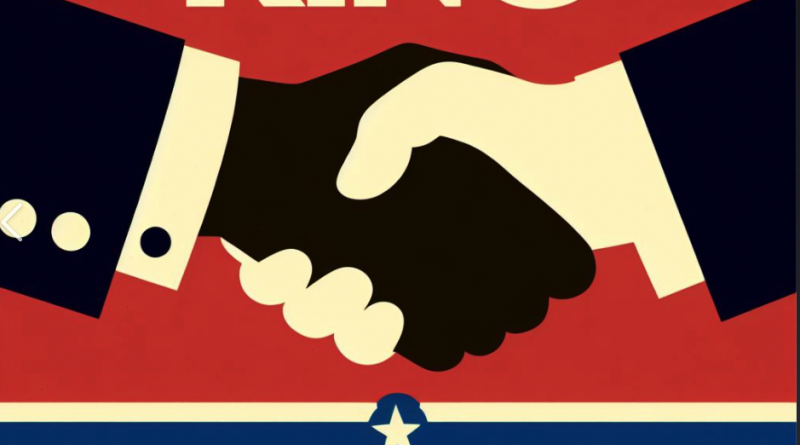What Could Have Been: King/Kennedy ’72
In this alternate timeline, the year is 1972, and the United States of America stands at the threshold of a profound transformation. Dr. Martin Luther King Jr., having narrowly escaped an assassination attempt on April 4, 1968, emerges not weakened but with a renewed vigor for the cause of justice and equality. The bullet that was meant to silence him instead amplifies his message and solidifies his role as the moral compass of a nation torn by racial and economic divides.
In the years following the assassination attempt, Dr. King expanded his advocacy, becoming a vocal opponent of the Vietnam War and linking the civil rights struggle at home to the fight against oppression abroad. His Poor People’s Campaign united a multiracial coalition demanding economic justice and human rights for all Americans, echoing his belief that poverty, hunger, and homelessness were unacceptable in the wealthiest nation in the world.
As the 1972 election approached, America was fatigued by war, scandal, and social unrest. Despite significant legislative victories of the Civil Rights Movement, the dream of true equality was still deferred. It was against this backdrop that Dr. King, after much contemplation and encouragement, decided to run for the presidency on a platform of radical change, advocating for a “Beloved Community” where social injustices were not tolerated.
His choice of running mate was as strategic as it was inspirational: Senator Robert F. Kennedy. Kennedy, having eschewed a presidential run after the attempt on King’s life and his own a few months later, had become a champion for social justice and an ally of the Civil Rights Movement. The King-Kennedy ticket was a beacon of hope, bridging divides across regions, races, and classes.
The campaign was a grassroots marvel, and the Democratic National Convention was a historic gathering, marked by unity and a shared vision. When Dr. King secured the nomination, it was a victory for all who had marched, protested, and yearned for a more equitable America.
The general election campaign was intense. President Richard Nixon, confident in his foreign policy achievements, was blindsided by the leak of information about the “Plumbers” — a covert group established by his administration in the wake of the Pentagon Papers being released to stop the leak of classified information. Additionally, the exposure of Operation Menu, a series of secret and unauthorized bombings in Cambodia, further undermined his credibility. These revelations painted a picture of an administration steeped in illegal activities and cover-ups.
The King-Kennedy message of integrity and unity stood in stark contrast to the scandal-ridden Nixon administration. On election night, the results were clear. Dr. Martin Luther King Jr. won in a landslide, a testament to his belief that the arc of the moral universe, while long, bends toward justice.
President King’s inauguration was a moment of catharsis for a nation battered by years of turmoil. His speech was a tapestry of hope, woven with the threads of his life’s work. He spoke of reconciliation and a future where children would “not be judged by the color of their skin but by the content of their character.”
The King-Kennedy administration embarked on ambitious programs to eradicate poverty, reform urban development, and overhaul the criminal justice system. Internationally, President King worked for peace, leveraging his moral authority to de-escalate conflicts and promote human rights.
Under his leadership, America took its first true steps toward becoming a “Beloved Community.” While challenges remained, and the work was far from complete, the nation had changed. It had elected not just a Black man as President, but a leader whose essence was intertwined with the soul of the nation.
Epilogue
In the warm embrace of an Atlanta spring, the city was abuzz with a sense of historic anticipation. It was April 1983, a day that would be etched in the annals of time, for it marked the opening of the King Presidential Library. Nestled in the heart of the city that Martin Luther King Jr. had once called home, the library stood as a monument not only to his presidency but to the enduring legacy of his dream.
The air was thick with the sweet scent of magnolias, their blooms like a natural benediction over the day’s events. People from all walks of life had gathered, a mosaic of the America that King had envisioned—an America where diversity was not just tolerated but celebrated.
At the center of it all was former President King, a figure of quiet strength, his hair now graying at the temples, the lines on his face etched by years of service to his nation. Beside him stood President Robert F. Kennedy, his running mate turned successor, his own face marked by the passage of time and the weight of high office.
The two men shared a bond forged in the fires of the civil rights struggle and tempered by the trials of leading a nation through times of change. They were brothers in arms, linked by a shared vision of what America could become.
As they approached the podium, the crowd fell into a reverent hush. President Kennedy spoke first, his voice resonant with the gravity of the moment.
“Ladies and gentlemen, we stand here today not just to honor a man but to celebrate a movement—a movement that reshaped our nation and redefined the very meaning of justice and equality,” Kennedy said, gesturing to the library’s elegant facade behind him.
“Martin once said that faith is taking the first step even when you don’t see the whole staircase. The King Presidential Library is a testament to that faith, a place where future generations can learn about the journey we’ve taken and the steps we’ve yet to tread.”
Applause rippled through the crowd, a wave of appreciation for the words of a President who had continued the work that King had begun.
Then it was King’s turn to speak. He stepped forward, his presence as commanding as it had been when he’d addressed the nation from the Oval Office, his voice still carrying the preacher’s power to stir souls.
“My friends,” King began, his eyes sweeping over the faces before him, “this library is not a monument to one man’s legacy, but to the collective spirit of all those who dared to dream of a better tomorrow. It stands as a beacon of hope, a reminder that while our work is never truly finished, our path is righteous and our cause is just.”
He paused, his gaze finding the young faces in the crowd, the children who would carry the torch forward.
“Let this place be a workshop for democracy, a school for freedom, and a home for the ideals that we hold dear. Let it remind us that the work of building a ‘Beloved Community’ is ongoing, and that each of us has a role to play in that grand construction.”
The crowd erupted into cheers, a resounding affirmation of King’s words. The former President smiled, a humble acknowledgment of the role he had played in shaping the nation’s destiny.
As the ceremony concluded, King and Kennedy stood shoulder to shoulder, watching as the doors to the library were opened for the first time. Inside, the halls were lined with artifacts of a pivotal era in American history—speeches that had galvanized a people, legislation that had transformed a society, and photographs of moments that had united a divided land.
The King Presidential Library was more than a building; it was a vessel of memory, a chronicle of struggle, and a blueprint for the future. And as the people streamed in, they carried with them the knowledge that they were part of a living history, one still being written with every step toward justice, every act of compassion, and every dream made manifest.
In the heart of Atlanta, under the watchful eyes of two Presidents who had steered the nation through stormy seas, the King Presidential Library stood as a lighthouse of hope, its beacon shining bright in the gathering dusk, a symbol that the dream would live on.
The story of President Martin Luther King Jr. and Vice President Robert F. Kennedy is not just a tale of what might have been. It is a reminder of the enduring power of hope and the relentless pursuit of a dream, a testament to the idea that even the most profound change begins with the courage of conviction and the will to act upon it.

